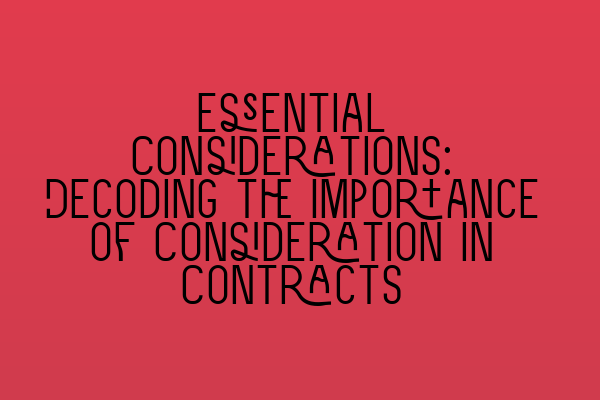Essential Considerations: Decoding the Importance of Consideration in Contracts
In the intricate world of contract law, an essential element that holds great significance is consideration. Simply put, consideration refers to something of value (such as money, goods, or services) that is exchanged between parties to a contract. It serves as the cornerstone upon which contracts are built, ensuring fairness and equity in the agreement. Understanding the importance of consideration is crucial for both solicitors and individuals entering into contracts. In this article, we will delve into the depths of consideration, its role in contract law, and why it should never be taken lightly.
Consideration, as an essential element of a contract, distinguishes it from a mere promise or gratuitous agreement. Without consideration, there can be no legally binding contract. The concept of consideration ensures that both parties have a vested interest in the agreement and that there is a fair exchange of benefits. It acts as a guarantee that the parties have each given and received something of value, which cements their intention to be bound by the terms of the contract.
One important aspect to bear in mind is that consideration must be sufficient, but need not be adequate. This means that the value exchanged does not have to be equal or proportionate; it simply needs to have some value. For example, if Party A agrees to sell a rare antique to Party B for a minimal amount, the consideration may be inadequate but still sufficient to form a valid contract. However, if one party promises to give a gift to another without any exchange of value, it lacks consideration and will not be legally enforceable.
Furthermore, consideration must be genuine and not merely illusory. In other words, it must be supported by legal rights or obligations. For instance, an agreement between two friends to go out for a meal would not be enforceable as a contract because it lacks consideration; there is no legal obligation or exchange of value involved. However, if one friend offers to pay for the meal in exchange for a favor or service, consideration would be present, rendering the agreement legally binding.
Consideration can take various forms, such as monetary payment, the transfer of goods or property, the provision of services, or even the promise to refrain from doing something. The key is that both parties are giving and receiving something that they perceive as valuable. It is important to note, however, that consideration must be lawful and not contrary to public policy or illegal in nature. An agreement to engage in criminal activity, for example, lacks lawful consideration and will not be enforceable in a court of law.
Taking consideration seriously is not just about abiding by legal requirements; it also ensures fairness and avoids disputes down the line. When entering into a contract, it is crucial to carefully consider the value being exchanged and the obligations being imposed. This is especially important for solicitors who are responsible for drafting contracts on behalf of their clients. By understanding and properly incorporating consideration into contracts, solicitors can help their clients avoid potential legal pitfalls.
In conclusion, consideration is an integral component of contract law that should never be overlooked or undervalued. It serves to validate and enforce agreements, ensuring fairness, equity, and legality. By grasping the significance of consideration, solicitors and individuals alike can navigate the complex world of contracts with confidence. So, the next time you find yourself engaged in a contract, remember the importance of consideration and its role in safeguarding your rights and obligations.
For more information and resources related to the Solicitors Qualifying Exam (SQE) and contract law, be sure to check out these related articles:
– SQE 1 Practice Exam Questions
– SQE 1 Practice Mocks FLK1 FLK2
– SQE 2 Preparation Courses
– SQE 1 Preparation Courses
– SRA SQE Exam Dates
Remember, staying informed and well-prepared is key to success in the legal profession.
